- Clone
- 7-239 (See other available formats)
- Regulatory Status
- RUO
- Other Names
- Sialic acid binding Ig-like lectin 1 (Siglec-1)
- Isotype
- Mouse IgG1, κ
- Barcode Sequence
- TACTCAGCGTGTTTG
- Ave. Rating
- Submit a Review
- Product Citations
- publications
| Cat # | Size | Price | Quantity Check Availability | Save | ||
|---|---|---|---|---|---|---|
| 346025 | 10 µg | $358 | ||||
CD169, also known as Siglec-1 and Sialoadhesin (Sn), is a 210 kD type I single membrane-spanning glycoprotein. It is the largest member of the Siglec family, consisting of 1709 amino acids and belonging to the immunoglobulin superfamily. CD169 is expressed by macrophages and dendritic cells. By its affinity to α2,3-linked sialic acid, it is involved in macrophage binding to different cell types such as granulocytes, monocytes, NK, B and T cells. Several CD169 counter receptors, such as CD227 on human breast cancer cells, CD43 on T cells and CD206 on macrophages, have been reported.
Product DetailsProduct Details
- Verified Reactivity
- Human
- Antibody Type
- Monoclonal
- Host Species
- Mouse
- Immunogen
- Human Rhinovirus (HRV14) infected, monocyte derived-DCs
- Formulation
- Phosphate-buffered solution, pH 7.2, containing 0.09% sodium azide and EDTA
- Preparation
- The antibody was purified by chromatography and conjugated with TotalSeq™-D oligomer under optimal conditions.
- Concentration
- 0.5 mg/mL
- Storage & Handling
- The antibody solution should be stored undiluted between 2°C and 8°C. Do not freeze.
- Application
-
PG - Quality tested
- Recommended Usage
-
Each lot of this antibody is quality control tested by immunofluorescent staining with flow cytometric analysis and the oligomer sequence is confirmed by sequencing. TotalSeq™-D antibodies are compatible with Mission Bio’s Tapestri Single-Cell Sequencing Platform for simultaneous detection of DNA and Protein.
To maximize performance, it is strongly recommended that the reagent be titrated for each application, and that you centrifuge the antibody dilution before adding to the cells at 14,000xg at 2 - 8°C for 10 minutes. Carefully pipette out the liquid avoiding the bottom of the tube and add to the cell suspension. For Proteogenomics analysis, the suggested starting amount of this reagent for titration is ≤ 1.0 µg per million cells in 100 µL volume. Refer to the corresponding TotalSeq™ protocol for specific staining instructions.
Buyer is solely responsible for determining whether Buyer has all intellectual property rights that are necessary for Buyer's intended uses of the BioLegend TotalSeq™ products. For example, for any technology platform Buyer uses with TotalSeq™, it is Buyer's sole responsibility to determine whether it has all necessary third party intellectual property rights to use that platform and TotalSeq™ with that platform. - Application Notes
-
Additional reported applications (for the relevant formats) include: Western blotting and inhibition of erythrocyte-rosetting with cells expressing CD169.
- Additional Product Notes
-
TotalSeq™-D reagents are designed to profile protein expression at single cell level. The Mission Bio Tapestri platform and sequencer (e.g. Illumina analyzers) are required. Please contact technical support for more information, or visit biolegend.com/totalseq/single-cell-dna
The barcode flanking sequences are CGAGATGACTACGCTACTCATGG (PCR handle), and GAGCCGATCTAGTATCTCAGT*C*G (capture sequence). * indicates a phosphorothioated bond, to prevent nuclease degradation.
View more applications data for this product in our Application Technical Notes. -
Application References
(PubMed link indicates BioLegend citation) -
- Kirchberger S, et al. 2005. J. Immunol. 175:1145.
- Schrauf C, et al. 2009. J. Immunol. 183:4440.
- RRID
-
AB_2927879 (BioLegend Cat. No. 346025)
Antigen Details
- Structure
- Type I single membrane-spanning lectin, 1709 amino acids, 210 kD, belongs to the immunoglobulin superfamily
- Distribution
-
Macrophages, dendritic cells
- Function
- Adhesion molecule
- Interaction
- α-2,3-linked sialic acid
- Ligand/Receptor
- CD227, CD43 and CD206
- Bioactivity
- Mediates sialic-acid dependent binding to granulocytes, monocytes, NK, B and T cells.
- Cell Type
- B cells, Dendritic cells, Macrophages
- Biology Area
- Cell Adhesion, Cell Biology, Immunology, Innate Immunity
- Molecular Family
- Adhesion Molecules, CD Molecules, Siglec Molecules
- Antigen References
-
1. Xiong YS, et al. 2009. Clin. Biochem. 42:1057.
2. Varki A, et al. 2009. Glycoconj J. 26:231.
3. Rempel H, et al. 2008. PLoS One. 3:e1967.
4. Crocker PR, et al. 2001. Trends Immunol. 22:337.
5. Hartnell A, et al. 2001. Blood 97:288. - Gene ID
- 6614 View all products for this Gene ID
- UniProt
- View information about CD169 on UniProt.org
Related Pages & Pathways
Pages
Related FAQs
Other Formats
View All CD169 Reagents Request Custom ConjugationCompare Data Across All Formats
This data display is provided for general comparisons between formats.
Your actual data may vary due to variations in samples, target cells, instruments and their settings, staining conditions, and other factors.
If you need assistance with selecting the best format contact our expert technical support team.
-
Purified anti-human CD169 (Sialoadhesin, Siglec-1)
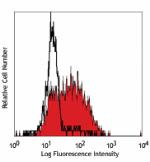
IFN-γ + TNF-alpha; stimulated human monocytes (day-3) staine... -
PE anti-human CD169 (Sialoadhesin, Siglec-1)

IFN-γ + TNF-α stimulated human monocytes (day-3)... -
Alexa Fluor® 647 anti-human CD169 (Sialoadhesin, Siglec-1)
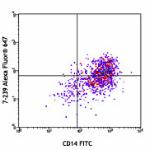
Human peripheral blood monocytes were stimulated with TNF-&a... 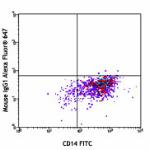
-
APC anti-human CD169 (Sialoadhesin, Siglec-1)
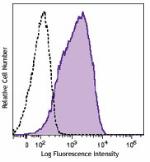
IFN-γ + TNF-α-stimulated human monocytes (day-3)... -
Brilliant Violet 605™ anti-human CD169 (Sialoadhesin, Siglec-1)
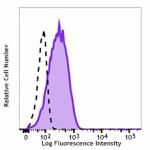
IFN-γ and TNF-α-stimulated human monocytes (day-3) were stai... -
TotalSeq™-A0206 anti-human CD169 (Sialoadhesin, Siglec-1)
-
Brilliant Violet 421™ anti-human CD169 (Sialoadhesin, Siglec-1)
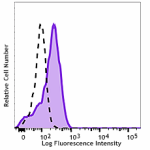
IFN-γ and TNF-α-stimulated human monocytes (day-3) were stai... -
PE/Cyanine7 anti-human CD169 (Sialoadhesin, Siglec-1)
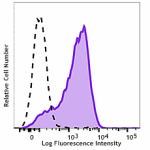
IFN-γ and TNF-α-stimulated human monocytes (day-... -
PE/Dazzle™ 594 anti-human CD169 (Sialoadhesin, Siglec-1)
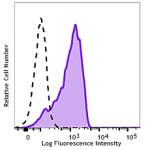
IFN-γ and TNF-α-stimulated human monocytes (day-... -
TotalSeq™-C0206 anti-human CD169 (Sialoadhesin, Siglec-1)
-
PerCP/Cyanine5.5 anti-human CD169 (Sialoadhesin, Siglec-1)
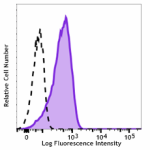
Human PBMC monocytes were stimulated with IFN-γ and TNF-α fo... -
TotalSeq™-B0206 anti-human CD169 (Sialoadhesin, Siglec-1)
-
TotalSeq™-D0206 anti-human CD169 (Sialoadhesin, Siglec-1)
-
Spark Red™ 718 anti-human CD169 (Siglec-1) (Flexi-Fluor™)
-
Spark Blue™ 574 anti-human CD169 (Siglec-1) (Flexi-Fluor™)
-
Spark Blue™ 550 anti-human CD169 (Siglec-1) (Flexi-Fluor™)
 Login/Register
Login/Register 













Follow Us